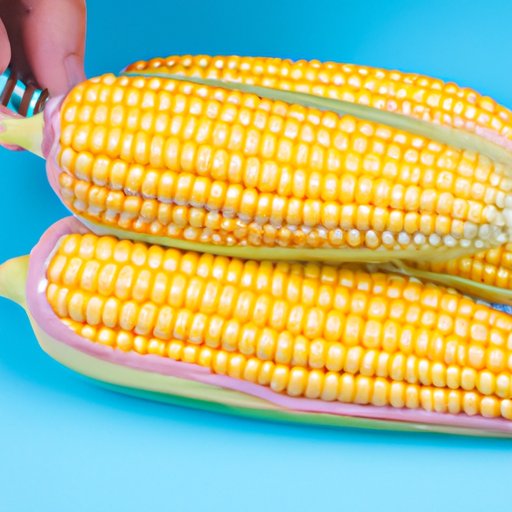
I. Introduction
Corns can be a very painful and frustrating problem for many people, especially those who are on their feet for a lot of the day. Fortunately, there are several remedies available to help get rid of corns and prevent them from coming back. In this article, we will explore different over-the-counter and natural remedies for corns, as well as lifestyle changes that can help prevent corns from developing in the future. We will also discuss the dangers of using harmful traditional remedies and when to seek professional treatment.
II. Step-by-Step Guide on Over-the-Counter Remedies
There are several over-the-counter remedies available that can help get rid of corns. Salicylic acid patches, creams, and callus cushions are the most popular options available. Salicylic acid helps to soften and dissolve the hard, dead skin that makes up the corn. Here’s how to use these remedies:
- Salicylic acid patches: Clean and dry the affected area. Then, apply the patch to the corn and leave it on for several hours. The patch will soften the corn and eventually cause it to peel off.
- Salicylic acid cream: Apply the cream to the affected area and cover it with a bandage. Leave it on for several hours or overnight. Then, use a pumice stone to gently exfoliate the softened skin.
- Callus cushions: These are small pads that can be placed over the corn to help cushion it and relieve pressure. They can be used with or without salicylic acid products.
When choosing an over-the-counter remedy, look for one that contains 12-40% salicylic acid. Be sure to follow the instructions carefully and only use the product on the affected area. If you have diabetes or poor circulation, consult with a doctor before using salicylic acid products.
III. Natural Approach on Home Remedies
If you prefer natural remedies, there are several options available that can help get rid of corns. Here are some of the most popular and effective natural remedies:
- Soak feet in warm water with Epsom salt: Soak your feet in a basin of warm water with 1-2 cups of Epsom salt for 10-15 minutes. Then, use a pumice stone to gently exfoliate the softened skin.
- Use apple cider vinegar: Soak a cotton ball in apple cider vinegar and place it on the corn. Secure the cotton ball with a bandage and leave it on overnight. In the morning, use a pumice stone to exfoliate the softened skin.
- Use castor oil: Apply castor oil to the corn and cover it with a bandage. Leave it on overnight and then use a pumice stone to gently exfoliate the softened skin.
- Use baking soda: Mix baking soda with water to form a thick paste. Apply the paste to the corn and cover it with a bandage. Leave it on overnight and use a pumice stone to exfoliate the softened skin in the morning.
Please note that natural remedies may take longer to work than over-the-counter remedies. Also, not all natural remedies are proven to be effective, so it’s important to do your research before trying them. Additionally, if you have sensitive skin, some of these remedies may cause irritation.
IV. Lifestyle Approach on Preventing Corns
There are several lifestyle changes you can make to prevent corns from developing in the first place. Here are a few tips:
- Choose comfortable shoes: Wear shoes that fit properly and have a wide toe box. Avoid shoes with high heels or narrow toe boxes.
- Use cushioned insoles: Insoles can help absorb shock and reduce pressure on your feet.
- Regularly exfoliate feet: Use a pumice stone to exfoliate your feet regularly, especially in areas where corns are prone to develop.
- Avoid standing for prolonged periods: If you’re on your feet for long periods of time, take frequent breaks to sit down and rest your feet.
Making these changes a habit can help prevent corns from developing in the future.
V. Harmful Traditional Remedies
While traditional remedies such as corn plasters, corn knives, and pumice stones may seem like a quick and easy solution, they can often be harmful and lead to further injury. Corn plasters contain acid that can irritate the skin and lead to burns. Corn knives can cause cuts and infections if not used properly. Pumice stones can be too abrasive, causing further damage to the skin.
It’s best to avoid these traditional remedies altogether and opt for over-the-counter or natural remedies instead.
VI. Professional Treatment and When to Seek it
If you have corns that are painful or persistent, it may be time to seek professional treatment. A podiatrist can help diagnose the problem and provide effective treatment. Here are some instances where seeking professional treatment is necessary:
- Infected corns: If you notice pus or other signs of infection, seek medical attention immediately.
- Underlying medical conditions: If you have diabetes, poor circulation, or other medical conditions that affect your feet, it’s important to seek medical attention for corns.
- Recurring corns: If you’ve tried several remedies and your corns keep coming back, it’s time to seek professional treatment.
If you do seek professional treatment, expect the podiatrist to remove the corn using a scalpel or other medical tool. They may also recommend orthotic devices or other treatments to help prevent further corns from developing.
VII. Conclusion
While corns can be painful and frustrating, there are several remedies available to help get rid of them and prevent them from coming back. Over-the-counter remedies such as salicylic acid patches and creams are effective for many people, as are natural remedies such as using Epsom salt or apple cider vinegar. Lifestyle changes such as wearing comfortable shoes and regularly exfoliating feet can also help prevent corns from developing. Remember to avoid harmful traditional remedies and seek professional treatment if necessary. With these tips in mind, you can keep your feet healthy and free from corns.




